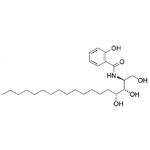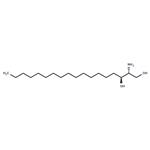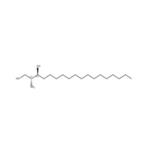Description
DL-
erythro Sphinganine (d18:0) is a precursor of ceramide and sphingosine as well as a substrate of sphingosine kinases, which generate sphinganine-1-phosphate . Sphinganine levels increase significantly in response to certain mycotoxins, including fumonisins as well as in some cancers. This product is a mixture of sphinganine (d18:0) , L-
erythro sphinganine (d18:0) , D-
threo sphinganine (d18:0) , and L-
threo sphinganine (d18:0). [Matreya, LLC. Catalog No. 1324]
Chemical Properties
White Powder
Uses
Biosynthetic precursor of sphingosine. Inhibits protein kinase C
Uses
DL-erythro-Dihydrosphingosine is an inhibitor of PKC (protein kinase C). This compound also blocks PLA2 (phospholipases A2) and the D-sphingosine precursor.
Definition
ChEBI: 2-aminooctadecane-1,3-diol is an aminodiol that is octadecane bearing two hydroxy substituents at positions 1 and 3 as well as an amino substituent at position 2. It is a sphingoid and an aminodiol.
Biological Functions
Sphingosine (Sph) is emerging as an intracellular regulator of cellular differentiation and apoptosis. Three stereoisomers,d-erythro-Sph,l-threo-Sph, and dl-erythro-dihydrosphingosine, were tested in the induction of apoptosis and inhibition of MAPK activity in three different kinds of solid tumour cell lines. d-erythro-Sph was strongest in these effects among the three compounds. l-threo-Sphingosine was partly active. On the other hand,dl-erythro-dihydrosphingosine was inactive[1].
Biological Activity
Protein kinase C inhibitor.
storage
-20°C (desiccate)
Purification Methods
Purify it by recrystallisation from pet ether/EtOAc or CHCl3. The (±)-N-dichloroacetyl derivative has m 142-144o (from MeOH). [Shapiro et al. J Am Chem Soc 80 2170 1958, Shapiro & Sheradsky J Org Chem 28 2157 1963.] The D-isomer crystallises from pet ether/Et2O and has m 78.5-79o, [] 28 +6o (CHCl3/MeOH, 10:1). [Grob & Jenny Helv Chim Acta 35 2106 1953, Jenny & Grob Helv Chim Acta 36 1454 1953, Beilstein 4 I 448, 4 II 757, 4 III 854, 4 IV 1887.]
References
[1] Chouhei Sakakura . “Selectivity of Sphingosine-Induced Apoptosis.” Biochemical and biophysical research communications 246 3 (1998): Pages 827-830.



